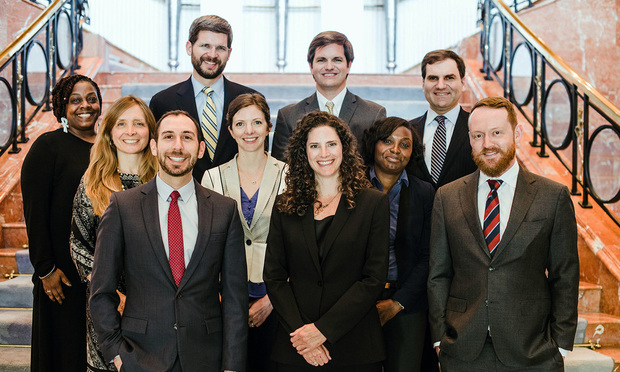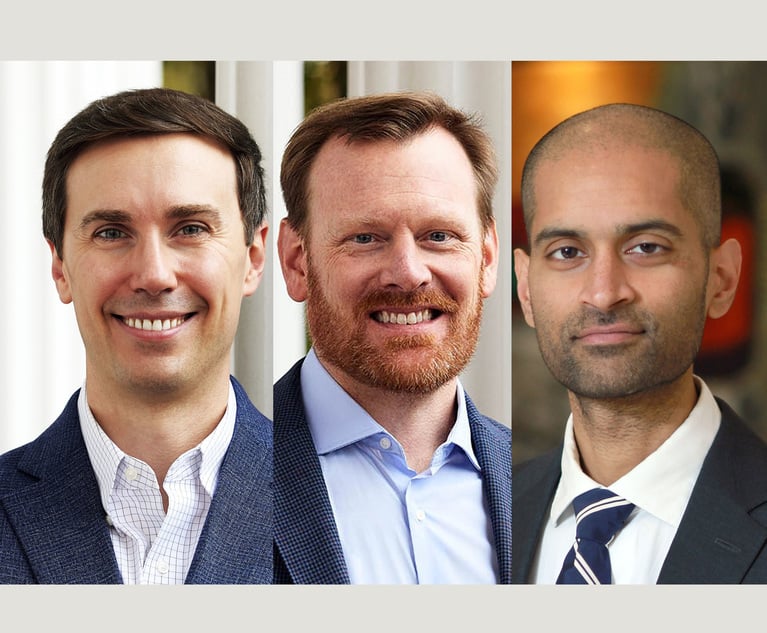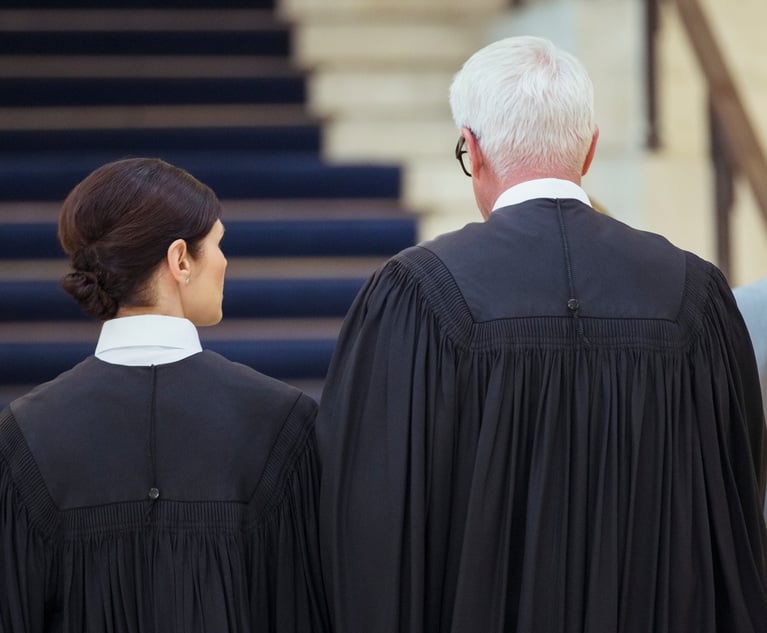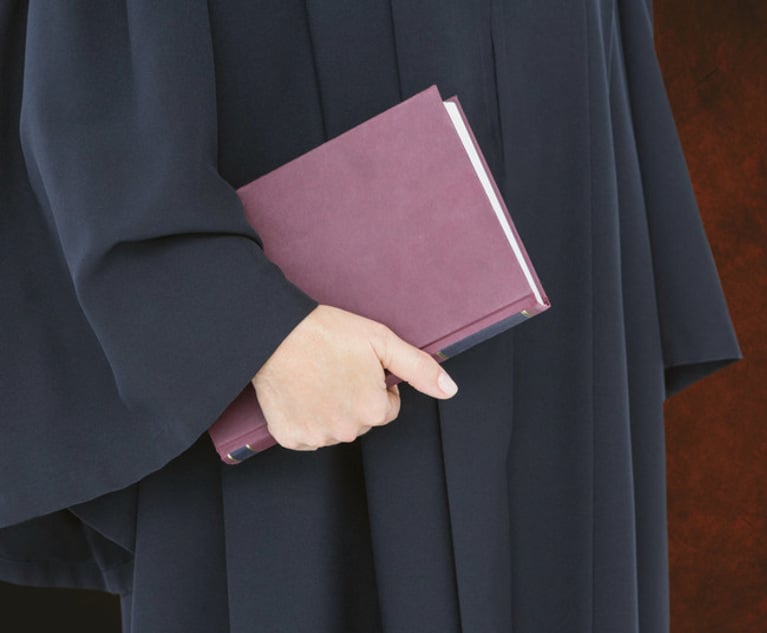Litigation Department of the Year, Small Firm, Special Litigation: Caplan Cobb
"The key factor to reaching a settlement is aligning the parties' perceptions of the risks and rewards of continuing litigation and the cost savings achieved by resolution."
June 19, 2019 at 02:00 PM
4 minute read
 Caplan Cobb Atlanta. (back row, from left) Toni Brown, James Cobb, Will Bishop and Mike Caplan and (front row, from left) Jennifer Cochran, Jarred Klorfein, Julia Stone, Jessica Caleb, Ashley Brown and Brandon Waddell. (Courtesy photo)
Caplan Cobb Atlanta. (back row, from left) Toni Brown, James Cobb, Will Bishop and Mike Caplan and (front row, from left) Jennifer Cochran, Jarred Klorfein, Julia Stone, Jessica Caleb, Ashley Brown and Brandon Waddell. (Courtesy photo)
Among its successes in 2018, Caplan Cobb represented The Atlanta Journal-Constitution and WSB-TV in their disputes with the city of Atlanta over Georgia Open Records Act requests. The matter grew dramatic when reporters uncovered a string of text messages in which Mayor Kasim Reed's press secretary instructed watershed officials to “be as unhelpful as possible” and to “drag this out as long as possible” when fulfilling an ORA request submitted by WSB-TV.
The discovery of the text messages prompted Caplan Cobb to file a 13-page complaint with the attorney general of Georgia, who initiated an investigation that led to criminal charges against the press secretary.
Caplan Cobb and lawyers for the city negotiated a settlement, mediated by the AG's office, by which the city agreed to develop training for city personnel on the ORA and create a position of the city transparency officer, who now oversees the city's ORA compliance, among other concessions. Cox Media Group donated $80,000 in legal fees the city of Atlanta paid as part of the settlement to the Georgia First Amendment Foundation.
Among its other cases, the firm joined a case two weeks before trial and successfully represented a client accused of fraud. It also negotiated a settlement for a class of retirees suing Athens-Clarke County for breach of its contractual duty to provide the retirees with no-cost health-insurance benefits. In November. the county agreed to pay retrospective damages of $3 million to the class members and to prospectively pay the class members $228 per month in health reimbursements, with guaranteed increases tied to inflation.
The firm provided these answers to the Daily Report's questions:
What was the most rewarding part of the open records matter?
It was a privilege to work alongside an exceptional team of journalists at AJC and WSB in a joint effort to improve governmental transparency. The reforms achieved by our settlement with the city would not have been possible without their first-rate journalism, especially in uncovering the critical evidence that exposed Open Records Act violations under the city's prior administration. AJC and WSB's news reporting ultimately showed the need for serious reform, and the city responded by agreeing to a series of improvements that, if successfully implemented, will help place the city on the forefront of open government.
One of your 2018 successes included taking over a case two weeks before trial. How do you assess whether to take on a representation so late in the process without setting you and your client up for failure because you don't have time to prepare?
The most important question we ask is whether we are able to devote the time and resources to master the record, meet with relevant witnesses and fully prepare for trial. It also helps to have the complete support of your client and co-counsel. In the Cisco matter, we were fortunate to have the cooperation of Tim Roberts and Bill Hunter of Oliver Maner, who were defense counsel in a related case. Without their assistance, we would not have been in a position to secure victory for our client.
What is a key to reaching a settlement? Is it just a matter of finding a number in between the parties' respective positions, or are other factors involved?
In our view, the key factor to reaching a settlement is aligning the parties' perceptions of the risks and rewards of continuing litigation and the cost savings achieved by resolution. Noneconomic forces, such as emotion and ego, may also play a role. But it is our job to facilitate favorable settlement opportunities and to give our clients the candid and objective advice necessary to make an informed decision about the benefits of settlement versus litigating a matter fully through trial.
This content has been archived. It is available through our partners, LexisNexis® and Bloomberg Law.
To view this content, please continue to their sites.
Not a Lexis Subscriber?
Subscribe Now
Not a Bloomberg Law Subscriber?
Subscribe Now
NOT FOR REPRINT
© 2025 ALM Global, LLC, All Rights Reserved. Request academic re-use from www.copyright.com. All other uses, submit a request to [email protected]. For more information visit Asset & Logo Licensing.
You Might Like
View All
Spalding Jurors Return $12M Verdict Against State Farm Insurance Client
10 minute read

Trending Stories
- 1'It's Not Going to Be Pretty': PayPal, Capital One Face Novel Class Actions Over 'Poaching' Commissions Owed Influencers
- 211th Circuit Rejects Trump's Emergency Request as DOJ Prepares to Release Special Counsel's Final Report
- 3Supreme Court Takes Up Challenge to ACA Task Force
- 4'Tragedy of Unspeakable Proportions:' Could Edison, DWP, Face Lawsuits Over LA Wildfires?
- 5Meta Pulls Plug on DEI Programs
Who Got The Work
Michael G. Bongiorno, Andrew Scott Dulberg and Elizabeth E. Driscoll from Wilmer Cutler Pickering Hale and Dorr have stepped in to represent Symbotic Inc., an A.I.-enabled technology platform that focuses on increasing supply chain efficiency, and other defendants in a pending shareholder derivative lawsuit. The case, filed Oct. 2 in Massachusetts District Court by the Brown Law Firm on behalf of Stephen Austen, accuses certain officers and directors of misleading investors in regard to Symbotic's potential for margin growth by failing to disclose that the company was not equipped to timely deploy its systems or manage expenses through project delays. The case, assigned to U.S. District Judge Nathaniel M. Gorton, is 1:24-cv-12522, Austen v. Cohen et al.
Who Got The Work
Edmund Polubinski and Marie Killmond of Davis Polk & Wardwell have entered appearances for data platform software development company MongoDB and other defendants in a pending shareholder derivative lawsuit. The action, filed Oct. 7 in New York Southern District Court by the Brown Law Firm, accuses the company's directors and/or officers of falsely expressing confidence in the company’s restructuring of its sales incentive plan and downplaying the severity of decreases in its upfront commitments. The case is 1:24-cv-07594, Roy v. Ittycheria et al.
Who Got The Work
Amy O. Bruchs and Kurt F. Ellison of Michael Best & Friedrich have entered appearances for Epic Systems Corp. in a pending employment discrimination lawsuit. The suit was filed Sept. 7 in Wisconsin Western District Court by Levine Eisberner LLC and Siri & Glimstad on behalf of a project manager who claims that he was wrongfully terminated after applying for a religious exemption to the defendant's COVID-19 vaccine mandate. The case, assigned to U.S. Magistrate Judge Anita Marie Boor, is 3:24-cv-00630, Secker, Nathan v. Epic Systems Corporation.
Who Got The Work
David X. Sullivan, Thomas J. Finn and Gregory A. Hall from McCarter & English have entered appearances for Sunrun Installation Services in a pending civil rights lawsuit. The complaint was filed Sept. 4 in Connecticut District Court by attorney Robert M. Berke on behalf of former employee George Edward Steins, who was arrested and charged with employing an unregistered home improvement salesperson. The complaint alleges that had Sunrun informed the Connecticut Department of Consumer Protection that the plaintiff's employment had ended in 2017 and that he no longer held Sunrun's home improvement contractor license, he would not have been hit with charges, which were dismissed in May 2024. The case, assigned to U.S. District Judge Jeffrey A. Meyer, is 3:24-cv-01423, Steins v. Sunrun, Inc. et al.
Who Got The Work
Greenberg Traurig shareholder Joshua L. Raskin has entered an appearance for boohoo.com UK Ltd. in a pending patent infringement lawsuit. The suit, filed Sept. 3 in Texas Eastern District Court by Rozier Hardt McDonough on behalf of Alto Dynamics, asserts five patents related to an online shopping platform. The case, assigned to U.S. District Judge Rodney Gilstrap, is 2:24-cv-00719, Alto Dynamics, LLC v. boohoo.com UK Limited.
Featured Firms
Law Offices of Gary Martin Hays & Associates, P.C.
(470) 294-1674
Law Offices of Mark E. Salomone
(857) 444-6468
Smith & Hassler
(713) 739-1250







